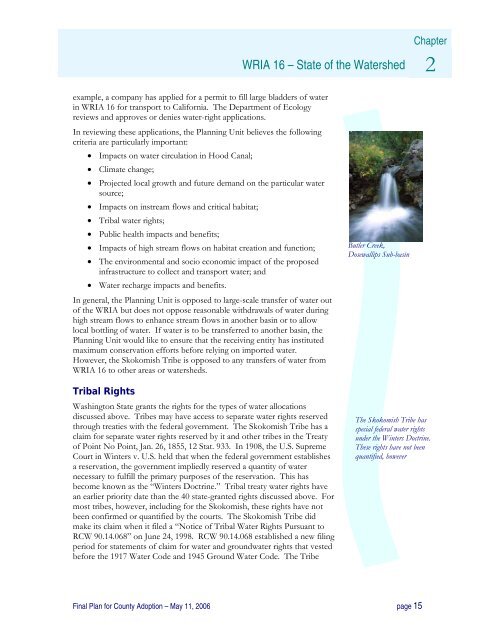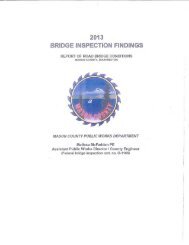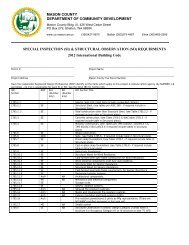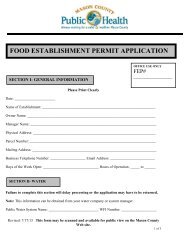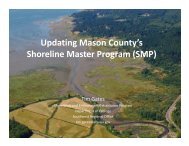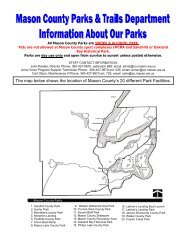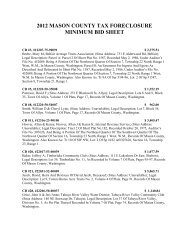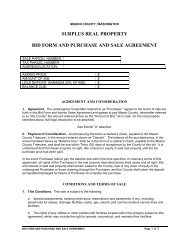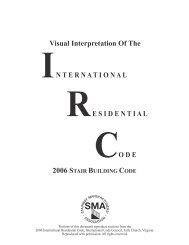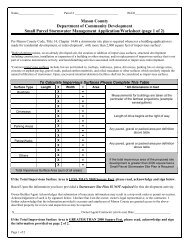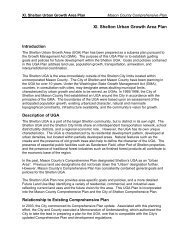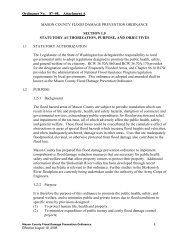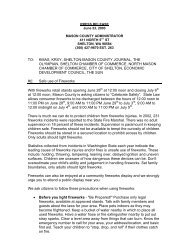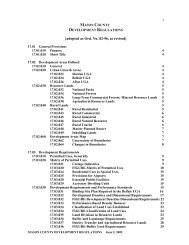Watershed Management Plan - Mason County
Watershed Management Plan - Mason County
Watershed Management Plan - Mason County
Create successful ePaper yourself
Turn your PDF publications into a flip-book with our unique Google optimized e-Paper software.
Chapter<br />
WRIA 16 – State of the <strong>Watershed</strong> 2<br />
example, a company has applied for a permit to fill large bladders of water<br />
in WRIA 16 for transport to California. The Department of Ecology<br />
reviews and approves or denies water-right applications.<br />
In reviewing these applications, the <strong>Plan</strong>ning Unit believes the following<br />
criteria are particularly important:<br />
• Impacts on water circulation in Hood Canal;<br />
• Climate change;<br />
• Projected local growth and future demand on the particular water<br />
source;<br />
• Impacts on instream flows and critical habitat;<br />
• Tribal water rights;<br />
• Public health impacts and benefits;<br />
• Impacts of high stream flows on habitat creation and function;<br />
• The environmental and socio economic impact of the proposed<br />
infrastructure to collect and transport water; and<br />
• Water recharge impacts and benefits.<br />
In general, the <strong>Plan</strong>ning Unit is opposed to large-scale transfer of water out<br />
of the WRIA but does not oppose reasonable withdrawals of water during<br />
high stream flows to enhance stream flows in another basin or to allow<br />
local bottling of water. If water is to be transferred to another basin, the<br />
<strong>Plan</strong>ning Unit would like to ensure that the receiving entity has instituted<br />
maximum conservation efforts before relying on imported water.<br />
However, the Skokomish Tribe is opposed to any transfers of water from<br />
WRIA 16 to other areas or watersheds.<br />
Tribal Rights<br />
Washington State grants the rights for the types of water allocations<br />
discussed above. Tribes may have access to separate water rights reserved<br />
through treaties with the federal government. The Skokomish Tribe has a<br />
claim for separate water rights reserved by it and other tribes in the Treaty<br />
of Point No Point, Jan. 26, 1855, 12 Stat. 933. In 1908, the U.S. Supreme<br />
Court in Winters v. U.S. held that when the federal government establishes<br />
a reservation, the government impliedly reserved a quantity of water<br />
necessary to fulfill the primary purposes of the reservation. This has<br />
become known as the “Winters Doctrine.” Tribal treaty water rights have<br />
an earlier priority date than the 40 state-granted rights discussed above. For<br />
most tribes, however, including for the Skokomish, these rights have not<br />
been confirmed or quantified by the courts. The Skokomish Tribe did<br />
make its claim when it filed a “Notice of Tribal Water Rights Pursuant to<br />
RCW 90.14.068” on June 24, 1998. RCW 90.14.068 established a new filing<br />
period for statements of claim for water and groundwater rights that vested<br />
before the 1917 Water Code and 1945 Ground Water Code. The Tribe<br />
Butler Creek,<br />
Dosewallips Sub-basin<br />
The Skokomish Tribe has<br />
special federal water rights<br />
under the Winters Doctrine.<br />
These rights have not been<br />
quantified, however<br />
Final <strong>Plan</strong> for <strong>County</strong> Adoption – May 11, 2006 page 15


